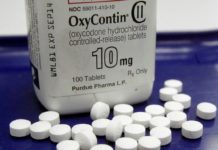On Tuesday, March 27, Donald Trump tweeted that he was “very pleased” to announce that a temporary memorial to victims of the opioid crisis would be hosted just outside the White House.
According to the tweet, the Trump Administration will be hosting a temporary opioid memorial in President’s Park during the month of April. The tweet stated that the memorial was being presented as part of a partnership between the White House, the United States Department of the Interior, and the National Park Service.
The memorial, which is called “Prescribed to Death,” is an effort by the National Safety Council, which is based in Illinois has a stated purpose of “eliminating preventable deaths.” The memorial, which will be free to visit during the time it will be hosted in the Ellipse near the White House, will be open to the public from April 12th through April 18th. Previously, the memorial has been on display in Chicago and Pennsylvania.
“Prescribed to Death” represents the roughly 22,000 Americans who died from synthetic opioid overdose during 2016, according to data from the Centers for Disease Control (CDC). The memorial features 22,000 medicinal pills, each with a face carved in it to represent someone who has died as a result of a prescription opioid overdose. The National Safety Council also hosts an online version of the art installation memorializing victims of the ongoing opioid crisis.
The tweet announcing that the memorial would be hosted near the White House is the Trump Administration’s latest effort to combat the opioid crisis. Previous efforts have included announcing that the Administration’s anti-drug ads would be its “most important thing” and appointing Kellyanne Conway, who has no experience with substance abuse recovery, to manage the White House opioid crisis strategy.
After the 6 days the installation will be open near the White House, it will continue to other locations in the United States that have been hit hard by the opioid crisis, including Ohio.
















